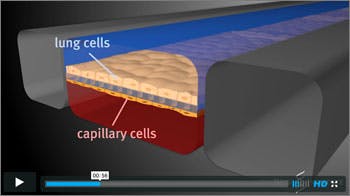UK award recognition validates US teams' approach to revolutionize drug development
BOSTON — In a London ceremony today, Wyss Founding Director Don Ingber, M.D., Ph.D., received the NC3Rs 3Rs Prize from the UK’s National Centre for the Replacement, Refinement and Reduction of Animals in Research (NC3Rs) for his innovative Lung-on-a-Chip — a microdevice lined by human cells that recapitulates complex functions of the living lung.

"We believe that our human breathing Lung-on-a-Chip, and other organ chips we have in development, represent a first wave of exciting new alternative approaches to animal testing that hopefully will change how drug development is carried out in the future," Ingber said. "This award helps to validate this radical new approach on the global stage, and to strengthen our resolve to work with government agencies and pharmaceutical companies that have been supporting our work to pursue this alternative approach to animal testing."
The lung-on-a-chip offers a new in vitro approach to drug screening by mimicking the complicated mechanical and biochemical behaviors of a human lung. It is a small device the size of a memory stick composed of a clear, flexible polymer that contains hollow channels fabricated using computer microchip manufacturing techniques.
Two of the channels are separated by a thin, flexible, porous membrane that is lined on one side with human lung cells from the air sac, and exposed to air; human capillary blood cells from the lung are placed on the other side with medium flowing over their surface to mimic blood flow. A vacuum applied to side channels deforms this tissue-tissue interface to re-create the way human lung tissues physically expand and retract when breathing.

In their latest publication in Science Translational Medicine being honored by this award, Ingber’s team used the lung-on-a-chip to mimic a complex human disease: pulmonary edema, or "fluid on the lungs." They closely mimicked a drug toxicity that produces pulmonary edema in humans, identified potential new therapies to prevent this life-threatening condition, and revealed new insights about the disease — specifically demonstrating on the chip that the physiological breathing motion of the lungs exacerbates drug toxicity-induced edema. They also studied the disease process in real time, precisely tracking fluid flow and clot formation, which cannot easily be done using an animal model.
"The NC3Rs annual 3Rs Prize champions the 3Rs globally [replacement, refinement, and reduction of animals used in research], rewarding real scientific and technological advances," said NC3Rs Chief Executive Vicky Robinson, Ph.D. Ingber and his team received a monetary award equivalent to about $30,000, which will be used to support continued research and collaboration around the on-chip technology.

"This disruptive technology may be the beginning of a revolution of the systems we use to model human disease and test drugs in the future, with great potential to reduce the need for animals," said Robinson.
Ingber’s lung-on-a-chip research has been funded by the National Institutes of Health (NIH) and Food and Drug Administration (FDA), and the Defense Advanced Research Projects Agency (DARPA), which is also supporting his work to integrate the lung-on-a-chip with more than nine other organ chips to create a "human body on-a-chip" that mimics whole body physiology.